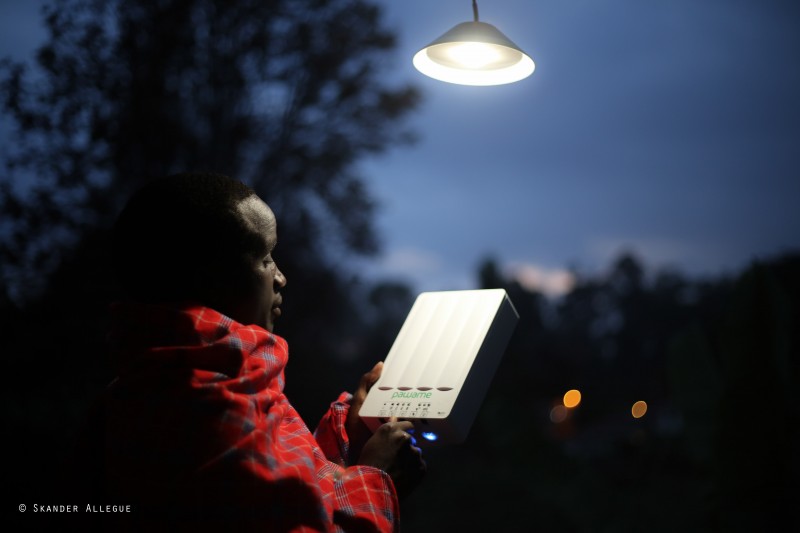
In a region so rich with energy, full of cities with bright lights and air conditioning that helps residents to withstand 50-degree summers, it can be easy to brush off the importance of basic electricity.
While the world’s biggest oil exporter Saudi Arabia has a population of 27 million people and a total power capacity of 55 gigawatts, Kenya, one of the biggest countries in sub-Saharan Africa and one of its biggest drivers of industrialisation, has a population of about 44 million, and a total power capacity of about 3 gigawatts. A staggering 150 million sub-Saharan African households – 70% of the vast region’s population – meanwhile, do not have access to grid power.
“The major problem that Africa is facing is electric transmission distribution, which is usually paid for by governments, who often don’t have money to do so,” Alex Allegue chairman and co-founder of UAE-based startup Pawame says. “There’s often no incentive to connect remote customers, because they’re often poor and can’t help to repay the government’s investment.”
Pawame began its journey after Allegue and the firm’s founders, who had spent years working in Saudi Arabia’s solar industry, reverse-engineered a range of solar kits to design a new product that was easy to operate and at a low cost. By early 2016, he had hired a core team and moved to Kenya, partnering with a German kit manufacturer that operated from Thailand.
Now, Pawame now offers a solar energy kit powered by a panel with a battery, which is connected to energy-efficient lamps, and contains a module which allows the user to charge the lamps through their mobile phone. The firm has sold more than 4,000 kits, and is set to announce a selection of new products. Pawame’s solution is relatively simple, but, put to good effect, has the ability to bring electricity and energy efficiency to millions of homes across Africa, transforming lives, according to Allegue.
The firm – which recently completed a $2 million round of funding – has already received numerous accolades since its inception. It was a finalist at both the prestigious New Venture Contest of Harvard Business School and at the SXSW Accelerator Pitch Event. Pawame was also selected as a semi-finalist by the MIT Enterprise Forum for the Pan-Arab Region for the Innovate for Refugees Competition for its work in one of the world’s largest refugee camps. The firm also began a partnership this year with MasterCard to deliver technology expertise to transform refugee settlements into “digitally-connected communities”.
“Universal energy remains a long-term aspiration rather than a short-term reality as electricity is still out of reach for over 700 million people in Africa,” Allegue says. “The potential for Pawame to impact lives is significant, and we have already touched the lives of more than 20,000 people in Kenya by giving them access not only to lighting, but to other life-enhancing services. We’re not only looking at markets without electricity, but also those with power shortages, which need multiple sources of energy.”
While Pawame has the potential to deliver the transformative benefit of basic electricity to its users, Allegue also believes that its potential only begins there. He says that it has the ability to provide economic inclusivity to citizens who were otherwise marginalised. A large factor in this will be the continent’s mobile revolution, which has a landscape unlike any other region on earth. “Landline telecom use never really picked up in Africa because of infrastructure issues,” he says. “However, once mobile networks picked up, Africa jumped directly to mobile. I believe we will see the same trend in Africa’s energy industry. It’s interesting that Africa’s most successful startup, M-Pesa, has done well because it could bridge the gap between banks and customers. It’s a platform that’s managed by Safaricom, and with a low-tech phone you can have a virtual wallet and buy goods for just $1.”
This gap between large institutions and the ordinary citizens of Africa is one that Pawame hopes to address. The firm hopes to allow customers to build a credit history that can unlock access to other life-changing products and services, from TVs and refrigerators to solar water pumps and school loans that they would not otherwise be able to access or afford.
“Once we build a connection to customers, we could become the micro-finance amazon for Africa,” Allegue says. “The true value will come from collecting and capitalising on information to make something bigger out of it. The more that customers grow in terms of financial inclusion, the more they can benefit from growth. That also allows us to provide goods and services through micro-credit. We aren’t an energy business, but more of a service and micro-finance business. We’re providing financing to get lighting, charging and other services and goods, that’s why we don’t fall under energy regulation, which makes us easy to scale.”
Pawame is currently developing an algorithm to forecast potential default payments, and once they have that in place, they hope to team up with insurance companies to monetise that information.
“We will have customers’ insurance details, which banks don’t have,” Allegue says. “It has limitless potential. We can use it to tackle a range of other pillars of development, including healthcare and education. We’re using Africa’s lack of infrastructure to our advantage.”





